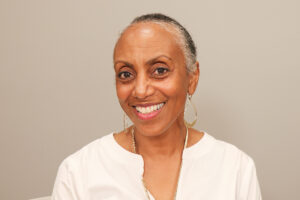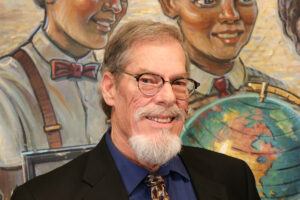Topic: Racial discrimination

Interview of Pamela Johnson Betts, March 25, 2022
Interviewed by Eric Sexton
The interview begins with Pamela Johnson Betts talking about attending Washington Elementary School, which was one of the schools noted in the landmark Brown v. Board Education case that overturned segregation. She describes her friendship with Cheryl Brown Henderson, daughter of Rev. Oliver Brown who was the plaintiff in the case, and the fact that the family never talked about the landmark case. The two women worked on saving the Monroe school building in the early days before it became a national historic site. This was the beginning of a 50 year career in public service Show Morefor both. Ms. Johnson Betts also talks about an experience she had in the 7th grade when a teacher slapped her (the only African-American student in the class) and the lessons from that experience.
Later in the interview she compares the leadership styles of the three governors with whom she worked and some of the public policy issues she was responsible for managing, such as childhood immunizations, public health. Her own experience in working on issues affect the elderly was shaped by those earlier experiences. She was fortunate to find other African American women role models in top management positions, such as Dr. Joycelyn Elder, Surgeon General of the United States. Even as a member of the Governor's cabinet, she continued to experience incidences of racism directed at her. She talks candidly about how she dealt with those incidents and their impact on her. The interview concluded with her stating that "public service is the rent we pay for living on this earth." Show Less

Interview of Melody McCray-Miller, April 21, 2022
Interviewed by Frances Jackson
Melody McCray-Miller describes her job as speaking truth to issues that were relevant at that time, and representing a group of people who were marginalized. Rep. Miller was not the "status quo." She doesn't consider herself a "politician" but instead, a public servant. Her concept of public policy or public service was influenced by the fact that she is a Black woman who was raised in a Black family. She is the daughter of Billy Q. McCray, the first African American Commissioner in Sedgwick County who also served as a state Senator. Show More One of her mentors described her as "tough as leather." Miller was in business with her husband, and also taught school prior to running for office. She detailed how she handled conflicts or incidents of racial discrimination by "pushing forward." The latter part of the interview deals with a variety of legislative issues McCray-Miller initiated or followed. Those issues ranged from early childhood education, to payday lending, juvenile justice and health policy. Show Less

Interview of Michael Young, February 28, 2025
Interviewed by Linda Jeffrey
This oral history of artist Michael Young was conducted in front of a live audience in the Kansas Statehouse while viewing the mural he painted depicting the U.S. Supreme Court decision, Brown v Board of Education. A short program preceded the interview which was followed by a question and answer session with the artist. The attached transcript includes the Q/A session but not the preliminary remarks by Senator Jeff Klemp, Senator Ty Masterson, Rep. Dave Buehler and Governor Laura Kelly. They were widely quoted in the press about the event. Two of the press accounts from Show MoreBryan Richardson, Hawvers Capitol Report/State Affairs and WIBW TV are also attached. To see the video of the introductory remarks, go to NEWS. Show Less
